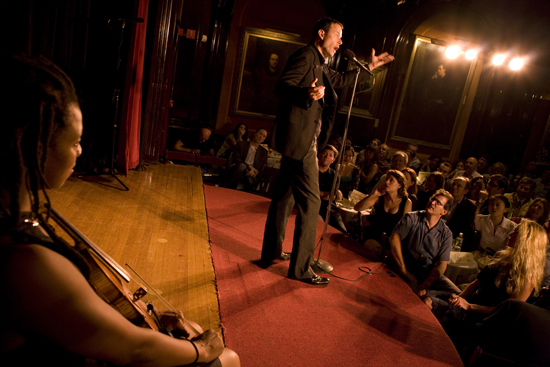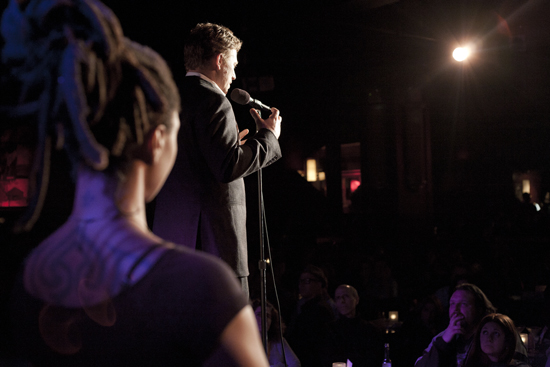Nightlife: The Moth StorySLAM
Storytelling for everyone, from anyone

George Dawes Green performs at Dial M for Moth: Thriller Stories. Photo by Denise Ofelia Mangen
Everyone has a story to tell, and at the Moth StorySLAM, everyday people tell theirs to standing-room-only crowds in venues typically reserved for entertainment professionals.
The Moth is many things. It’s a podcast, a traveling tour featuring trained and famous speakers (Malcolm Gladwell, Salman Rushdie, an astronaut, and a hot dog eating champion, to name a few), a book, and a nonprofit community education program. The outfit’s National Public Radio show, The Moth Radio Hour, won a Peabody Award in 2010, and its staged events have been described by the Wall Street Journal as “New York’s hottest and hippest literary ticket.”
Poet and novelist George Dawes Green founded the Moth hoping to create in New York the feel of sultry summer evenings in his native Georgia, where a group of locals would gather on a friend’s screened porch and share stories of their lives. A hole in the screen would let in moths attracted to the light, and the group started calling themselves the Moths.
Started in 1997, the Moth now hosts events in cafés and clubs across the country, and at least two StorySLAMs are scheduled in Boston each month.
We caught a StorySLAM at Laugh Boston, at the Westin Waterfront Hotel, where it played to a packed house. Snacks and drinks were available, and we ordered the olive hummus with fried pita chips ($7) and Angry Orchard hard cider ($7).
This open-mic storytelling competition invites anyone attending to share his or her story, any story, as long as it adheres to the night’s designated theme. Hopeful storytellers put their name in a hat, and 10 names are chosen at random. Each raconteur has five minutes—no notes allowed.

This StorySLAM’s theme was song, and the night started with the host’s request for a group sing-along of “She’ll Be Coming ’Round the Mountain.” Three teams of judges were chosen—also at random—from the crowd, and they were instructed to score each story on a scale of 1.0 to 10.0. At the end of the night, the highest scoring storyteller left with bragging rights and a bag of Moth goodies.
The evening’s first storyteller, Don, weaved through the tables and hopped on stage, where he grabbed the microphone and dived straight into his story—no introductions, no disclosures. Postcollege, we learned, Don got involved with a crowd of community theater nuts. One night, after a performance of the musical Man of La Mancha, Don and a friend were relocating props, including a leg from a mannequin. They got on a crowded elevator, arms full of equipment, and the friend called out, “Anybody need a leg?” No one laughed—there was only silence. As the elevator stopped and people left, Don and his friend realized that one of the people in the elevator was missing a leg.
Other storytellers explored the theme of song in unexpected ways. For Nicole, road trips with her business partner turned into a frustrating effort to decode his music choices for any sign of romantic affection (and yes, it turned out he was in fact “Hooked on Her”). Micayla, who remembered how to play only one song from her lessons in high school, took advantage of the Play Me, I’m Yours piano project and was offered an opportunity to jam with a stranger’s band, a jumping off point to playing many more songs. And David recounted how a new friendship in his junior year physics class endured despite his friend’s passion for death metal music.
After each story, the host read answers to a question everyone attending had been asked: “What is the one song, which when you hear it, you cannot divorce from a certain memory?” The answers were anonymous, written on strips of paper, and picked out of a bag. Responses ranged from someone associating the Beach Boys’ “Good Vibrations” to “island hopping in Greece” to another linking “Homeward Bound” with “playing basketball on the playground when being 5’9” felt tall.”

Brandon, although he couldn’t understand the lyrics even 30 years later, recounted how the music of Phil Collins was the first to turn his living room into Madison Square Garden. For another speaker, the lessons of love and acceptance she learned from Barney’s songs strengthened her resilience against the racial bullying she experienced on the school playground.
The night’s winner was Dan, who taught English in Hungary and as the only English speaker for miles, felt like an outsider. That all changed when he was the guest of honor at a school fundraiser. Feeling courageous, he accepted an invitation to sing “What a Wonderful World” for the crowd, even though he knew almost none of the words. He simply made them up, hoping that his audience would have little idea what he was singing. The Hungarians loved it, so much so that over 300 people gave him a standing ovation. “And in that moment,” he said, “I knew I wasn’t a stranger to these people…I was a celebrity.” Dan then received the second standing ovation of his life.
The next Boston Moth StorySLAM, themed Blood, Sweat, and Tears, is Tuesday, April 15, at the American Repertory Theater’s Oberon Theater, 2 Arrow Street, Cambridge. Doors open at 7 p.m., and stories begin at 8. Tickets are $8 for general admission, $16 for premium seats, and can be purchased online here a week in advance. By public transportation, take a Green Line B trolley inbound to Hynes Convention Center, then the #1 bus toward Harvard Square 10 stops to Massachusetts Avenue at Trowbridge Street, then walk along Mass. Ave. and turn left at Arrow Street.
This is part of a series featuring Boston nightlife venues of interest to the BU community. If you have any suggestions for places we should feature, leave them in the Comment section below.
Paula Sokolska can be reached at ps5642@bu.edu.
Comments & Discussion
Boston University moderates comments to facilitate an informed, substantive, civil conversation. Abusive, profane, self-promotional, misleading, incoherent or off-topic comments will be rejected. Moderators are staffed during regular business hours (EST) and can only accept comments written in English. Statistics or facts must include a citation or a link to the citation.